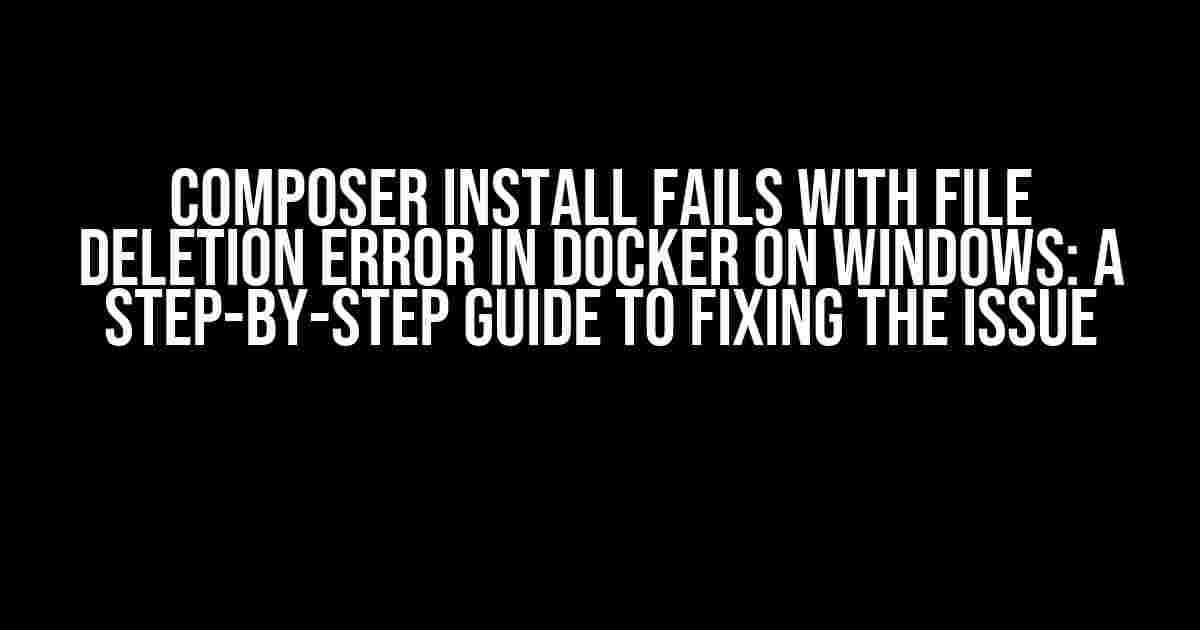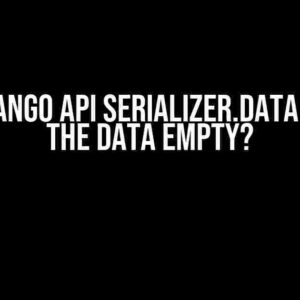Are you tired of encountering the frustrating “file deletion error” when running Composer install in a Docker container on Windows? You’re not alone! This error can be a major roadblock in your development workflow, but fear not, dear reader, for we’ve got a comprehensive guide to help you overcome this hurdle.
- What causes the file deletion error?
- Prerequisites
- Solution 1: Run Composer with the –no-scripts flag
- Solution 2: Use the COMPOSER_HOME environment variable
- Solution 3: Use a volume mount for the Composer cache
- Solution 4: Disable Docker’s file deletion on Windows
- Solution 5: Use a Linux-based host instead of Windows
- Conclusion
What causes the file deletion error?
Before we dive into the solution, let’s understand what causes this error in the first place. The file deletion error typically occurs when Composer tries to delete files or folders that are being used by another process. This can happen when you’re running multiple containers or services that rely on the same file system.
Prerequisites
Before we begin, make sure you have the following setup:
- Docker installed on your Windows machine
- A Docker container running with a Linux-based image (e.g., Ubuntu or Debian)
- Composer installed within the container
Solution 1: Run Composer with the –no-scripts flag
A quick and easy fix is to run Composer with the –no-scripts flag. This flag tells Composer not to run the scripts defined in your composer.json file, which can help avoid file deletion errors.
composer install --no-scriptsThis solution works, but it’s not ideal, as it skips running the scripts that might be essential for your project. If you need to run scripts, move on to the next solution.
Solution 2: Use the COMPOSER_HOME environment variable
Another approach is to set the COMPOSER_HOME environment variable within your Docker container. This variable tells Composer where to store its cache and config files.
Create a new environment variable in your Dockerfile or docker-compose file:
ENV COMPOSER_HOME=/path/to/composer/homeThen, update your composer.json file to include the following configuration:
"config": {
"vendor-dir": "vendor",
"bin-dir": "bin",
"cache-dir": "${COMPOSER_HOME}/cache"
}This solution ensures that Composer stores its cache and config files in a separate location, reducing the likelihood of file deletion errors.
Solution 3: Use a volume mount for the Composer cache
A more robust solution is to use a volume mount for the Composer cache. This approach allows you to persist the cache even after the container is restarted or deleted.
Update your docker-compose file to include a volume mount:
version: '3'
services:
composer:
...
volumes:
- ./composer-cache:/app/composer/cacheCreate a new directory for the cache:
mkdir composer-cacheThen, update your composer.json file to include the following configuration:
"config": {
"vendor-dir": "vendor",
"bin-dir": "bin",
"cache-dir": "./composer-cache"
}This solution ensures that the Composer cache is persisted across container restarts, reducing the likelihood of file deletion errors.
Solution 4: Disable Docker’s file deletion on Windows
Windows has a feature called “File Deletion Delayed Error” that can cause issues with file deletion in Docker containers. Disabling this feature can help resolve the file deletion error.
To disable the feature, follow these steps:
- Open the Registry Editor (Regedit.exe) as an administrator
- Navigate to the following key: HKEY_LOCAL_MACHINE\SYSTEM\CurrentControlSet\Control\FileSystem
- Right-click on the “FileSystem” key and select “New” > “DWORD (32-bit) Value”
- Name the new value “DisableFileDeletionErrorMode”
- Set the value to 1
Restart your Docker service after making these changes:
docker restartSolution 5: Use a Linux-based host instead of Windows
If none of the above solutions work, consider using a Linux-based host instead of Windows. Linux hosts don’t suffer from the same file deletion issues as Windows, making it a more reliable choice for Docker containers.
Conclusion
There you have it, folks! Five solutions to fix the “file deletion error” when running Composer install in a Docker container on Windows. Remember to try each solution in sequence, as they’re listed in order of simplicity and effectiveness.
By following this guide, you should be able to resolve the file deletion error and get back to developing your project without any hiccups. Happy coding!
| Solution | Description |
|---|---|
| 1. –no-scripts flag | Run Composer with the –no-scripts flag to skip running scripts |
| 2. COMPOSER_HOME environment variable | Set the COMPOSER_HOME environment variable to store Composer cache and config files in a separate location |
| 3. Volume mount for Composer cache | Use a volume mount to persist the Composer cache across container restarts |
| 4. Disable Docker’s file deletion on Windows | Disable the “File Deletion Delayed Error” feature on Windows to resolve file deletion issues |
| 5. Use a Linux-based host | Use a Linux-based host instead of Windows to avoid file deletion issues |
Remember, if you’re still experiencing issues, feel free to ask for help in the comments below. We’re here to help!
Frequently Asked Questions
Having trouble with composer install failing with a file deletion error in Docker on Windows? We’ve got you covered! Below are some frequently asked questions that might help you troubleshoot the issue.
What is the common error message I get when running composer install in Docker on Windows?
You’re likely to see an error message like “Failed to delete … permission denied” or “unlink … Permission denied”. This is usually due to Windows file system permissions issues.
Why does the composer install command fail with a file deletion error?
The fail occurs because Docker on Windows uses a virtual file system that is not compatible with the Windows file system. When composer tries to delete files, it encounters permission issues, leading to the error.
How can I fix the file deletion error when running composer install in Docker on Windows?
You can try running the command with elevated privileges using `docker-compose run –rm –user $(id -u):$(id -g) composer install` or set the `COMPOSER_HOME` environment variable to a directory that has write permissions.
Can I avoid the file deletion error by configuring Docker on Windows?
Yes, you can configure Docker to use a different file system, such as the “Windows Container” mode, which allows for better file system compatibility. Alternatively, you can use a volume mount to persist data and avoid file deletion issues.
Are there any composer plugins or configurations that can help with file deletion errors in Docker on Windows?
Yes, plugins like `composer-registry` or `composer-changelog` can help with file deletion issues by modifying the way composer manages files. You can also try setting the `–no-cache` flag when running composer install to avoid file deletion errors.


